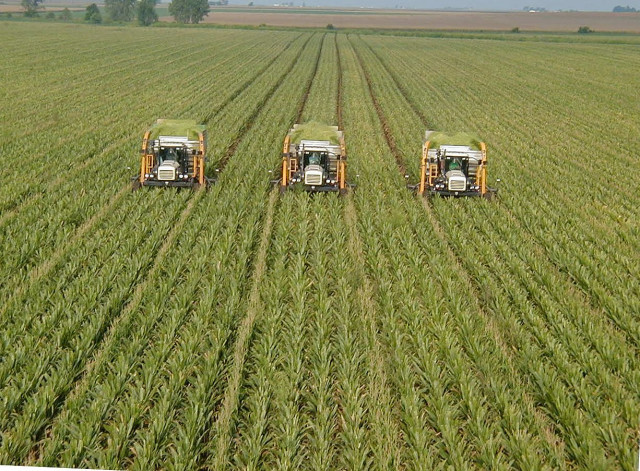Policy missteps threaten agriculture
Water shortages, unplanned policy shifts, heavy rainfall put exports at risk

After playing a major role in reviving overall economic growth in the previous fiscal year 2023-24, Pakistan's agricultural economy is weakening due to recent heavy monsoon downpours and flood-like conditions in some parts of the country.
Farmers are planning a lower sowing of the staple wheat crop this fiscal year after the Punjab government abandoned growers by failing to procure the grain last season, contrary to policy.
The non-availability of water during sowing time and high temperatures have already severely impacted cotton sowing and output. In addition, the country's multibillion-dollar rice exports are at risk after India returned to the global rice export market by removing the minimum export price (MEP) of Basmati rice in 2024.
The government's own preliminary reports have raised red flags about the current state of agronomy in the country, creating uncertainty about whether the sector will continue to be a strong pillar of growth in fiscal year 2024-25 as it was in the previous year, or whether it requires serious attention to avoid an emerging crisis.
Wheat and cotton, two of Pakistan's five major crops, are projected to perform poorly in FY25. This could not only diminish their valuable contribution to the country's overall economic turnaround in FY25 but also put pressure on the external economy.
The shortfall in the wheat crop and the rapid decline of the cash crop, cotton, would necessitate imports, impacting foreign exchange reserves.
Despite rain and light flooding, Pakistan's rice export crop is expected to remain strong, with a projected yield between 9.6 and 10 million tonnes in the current season, as it is a water-friendly and water-resilient crop.
However, the rice export sector faces serious challenges due to India's return to the Basmati export market, which could deal a significant blow to Pakistan's over $3 billion annual rice export revenue, potentially reducing this multibillion-dollar commodity's contribution in FY25.
The latest fortnightly cotton arrival report indicates a 60% drop in the commodity's output in the first two months of the season, with production down to 1.22 million bales as of August 31, 2024, compared to 3.04 million bales at the same time last year.
Speaking to The Express Tribune, agriculture expert Sono Khangharam projected that farmers might switch 10-20% of their wheat land to sow high-return oilseeds in the upcoming season (October-March), after receiving significantly lower prices for their grain due to Punjab's failure to procure it last season.
Earlier, Finance Minister Muhammad Aurangzeb stated that agriculture and IT would remain two major sectors of the economy, extending valuable support in achieving growth targets for FY25.
The revival of the industrial and services sectors is critical to accelerating growth in the current fiscal year to offset the expected drop in agricultural output.
The Ministry of Finance's latest monthly report, Economic Update and Outlook (August 2024), emphasises that the Kharif 2024 crop production will depend heavily on crop-specific weather patterns, which will play a critical role in determining yields.
"The recent and ongoing rainfall spells can have both positive and negative impacts on rice, sugarcane, cotton, fodder, and vegetables, depending on whether the rains sweep away farmlands," the report states.
The State Bank of Pakistan (SBP) said in its latest Monetary Policy Statement, issued this week, that the outlook for the agriculture sector has weakened.
This outlook is attributed to an expected shortfall in cotton production compared to government targets, due to a reduction in the area under cultivation and a significant decline in cotton arrivals by the end of August 2024.
On the other hand, the SBP observed that continued easing of inflationary pressures and the unfolding effects of recent policy rate cuts would support growth prospects in the industrial and services sectors.
As a result, the real GDP growth outlook remains consistent with the bank's earlier assessment of 2.5 - 3.5% for FY25.
In its June 2024 report, the United States Department of Agriculture (USDA) highlighted a dramatic shift in policy when the Punjab provincial government did not procure wheat last season. This marked a break from its long-standing tradition of buying the grain annually to support farmers.
The decision, made without prior announcement or consultations with producers, caused wheat prices to plunge 30% below the government's minimum support price.
"This reversal of the decades-long wheat procurement policy eroded the Punjab provincial government's credibility and will likely negatively impact the area planted with wheat next year (October-March FY25)," the report warned.
At the start of September, Sindh Agriculture Minister Sardar Mohammad Bux Mehar reported in a preliminary assessment that recent heavy monsoon rains and flooding have caused widespread crop damage, resulting in an estimated Rs86.86 billion loss to farmers in the province.
Mehar reported that 541,351 acres of crops were completely destroyed. Specifically, 293,580 acres of cotton were severely impacted by the downpours.
Rice crops were completely destroyed over 35,271 acres and partially damaged across 269,016 acres. Similarly, date palm groves suffered massive losses on 53,195 acres and partial damage on 32,849 acres. The sugarcane crop was entirely destroyed over 26,382 acres, with partial damage on another 69,689 acres
The heavy rains caused a 21% loss in cotton output and a 41% loss in date palm production. In addition, tomato nurseries experienced a 3.4% loss, sesame crops a 22% loss, onions a 58% loss, chilies a 12% loss, and vegetables suffered an 18% overall loss.
The minister listed the districts most affected by the rains, which include Badin, Dadu, Ghotki, Sukkur, Hyderabad, Larkana, Sanghar, Thatta, Sujawal, Mirpurkhas, Khairpur, Umerkot, Tando Allahyar, Shikarpur, Shaheed Benazirabad, Matiari, Tando Mohammad Khan, and Tharparkar.
THE AUTHOR IS A STAFF CORRESPONDENT



















COMMENTS
Comments are moderated and generally will be posted if they are on-topic and not abusive.
For more information, please see our Comments FAQ